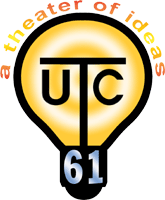

HOME PAGE (More Ionesco links below)

My brother David began reading me the plays of Eugene Ionesco when I was seven
years old (he was sixteen at the time), just after we had finished the Oz series.
My parents would come in and scold him: "He's not interested in that," they would
say. "He doesn't understand it." "I like it," I'd insist, and they would leave
us alone. It never occurred to me that it was unusual that I would enjoy it, or
that these plays were unusual in theater. It was only in college, when I picked
them up again, that I began to truly appreciate them. I had started to become
interested in directing, at the time, and Ionesco seemed the most natural choice.
"They're hard to understand," my college roommate complained. "I like it," I said.
I soon found I was not alone. I found Ionesco echoed in the plays of a hundred
different playwrights. His tragic farces were groundbreaking when he wrote them,
the first of the "Theater of the Absurd" as Martin Esslin termed it. They were
unconcerned with the artificial reality of realism, instead reaching a deeper
theatrical reality, where joy and despair met. And though Ionesco avoided the
political or moralistic plays, his own strong sense of how to treat other humans
formed a structure deep beneath his work.
Nowadays, far fewer people warn that Ionesco is difficult to understand. His
innovations have become the vernacular of modern theater. And compared to his
successors, it is sometimes even hard to believe that he was once considered so
experimental. Yet, despite Ionesco's influence, most Americans are exposed to
few if any of his works directly. Some have been fed Rhinoceros or The Bald
Soprano in the French classes, but even those people know little of his work
beyond that. Why is it, I've wondered, that Ionesco's work is so infrequently
performed, compared to other great playwrights of the twentieth century. I refer
not only to playwrights like Tennessee Williams and Bertolt Brecht, but also
Beckett, another pioneer of the Theater of the Absurd.
I would not presume to boil down the complexities of that question into this short
essay. But I will mention one thing that, I believe, is a contributing factor.
It is very difficult to institutionalize Ionesco. His plays live in a way that
invites interpretation and reinterpretation. By rejecting the formal rules of
theater, Ionesco has created something not completely measurable, a sort of quantum
theater. It's indefinable till it's observed. Then it changes.
Yet it is just that factor that keeps his plays as alive today as they ever were.
You will not see any "definitive" interpretation of Ionesco's work in this Festival.
Instead, you will see 39 plays done in 39 ways, all reinvented and instilled with
the life of those working on them. To keep this living, ever-changing sense, I
have set up a program of Shorts that shifts from performance to performance, so
that different Shorts precede different performances on different days. I urge
you to see what you can of them, attend our seminars and discuss what you saw,
and attend our film program and see other interpretations of Ionesco's work
altogether.
Catch them while you can. When they appear next, they'll be different.
--Edward Einhorn

 Links to other Ionesco Festival sites
Links to other Ionesco Festival sites
 Untitled Theater Company #61 Home Page
Untitled Theater Company #61 Home Page
 Ionesco's biography
Ionesco's biography
 Essay on Rhinoceros
Essay on Rhinoceros
 Production List
Production List
 Shorts
Shorts
 Seminars
Seminars
 Readings
Readings
 Venues
Venues
 Day by Day Schedule
Day by Day Schedule
 Films
Films
 Staff and sponsors
Staff and sponsors
 Festival Passes
Festival Passes
 More information on Ionesco and his plays at www.ionesco.org
More information on Ionesco and his plays at www.ionesco.org